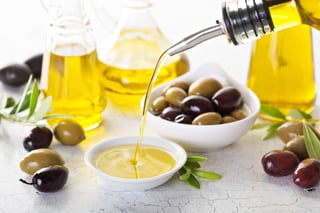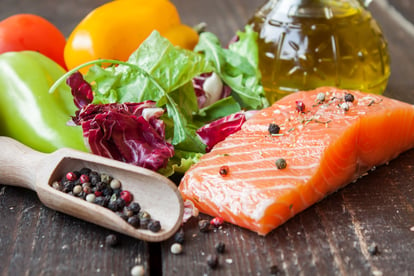What is the Mediterranean Diet?
This diet is inspired by the flavors and colors of the balmy Mediterranean countries such as Greece, Spain, Cyprus, and Southern Italy. It consists largely of fruits, whole grains, legumes, vegetables, fish, and lean proteins. It also favors cooking in healthy oils such as olive instead of butter or saturated fats. And as a bonus, it encourages wine with dinner, preferably red!
The Facts
It’s very difficult to track something like diet over a long period of time because it relies  heavily on the patients being accurate and honest record keepers. Results are also somewhat skewed because eating some foods has an immediate but possibly temporary effect while others must be ingested overtime to foster any measurable improvement. However, those who reported eating foods that are part of this style of eating are known to have fewer heart and weight issues as well as better overall health. They are also found to be more active and less likely to be smokers, thereby putting less stress on lungs and improving cardio health. Basically those following this diet have improved lung capacity but it’s not precisely known what is attributed to the diet and what is due to healthy lifestyle habits.
heavily on the patients being accurate and honest record keepers. Results are also somewhat skewed because eating some foods has an immediate but possibly temporary effect while others must be ingested overtime to foster any measurable improvement. However, those who reported eating foods that are part of this style of eating are known to have fewer heart and weight issues as well as better overall health. They are also found to be more active and less likely to be smokers, thereby putting less stress on lungs and improving cardio health. Basically those following this diet have improved lung capacity but it’s not precisely known what is attributed to the diet and what is due to healthy lifestyle habits.
The most far reaching study regarding this method of eating was conducted from 1986 through 1998 whereby 51,529 male health professionals, age 40-75 filled out mail-in questionnaires regarding diet and lifestyle.
Easy Changes
Mediterranean may sound exotic which is already raising a red flag for all you meat and potato types but incorporating this into your diet is not hard. You don’t have to go all the way across town to a specialty shop and spend a fortune for ingredients. A few small changes will have you eating healthier in no time!
Hold the Butter!
 Butter does contain a handful of vitamins and minerals such as, Vitamins A, D, E, B12, and K2, as well as manganese, selenium, copper, zinc, and iodine. Butter’s main downfall is that it is high in saturated fat which has been shown to raise cholesterol levels which is one of the main risk factors for cardiovascular disease. Mediterranean dishes generally use extra-virgin olive oil for cooking and baking. Olive oil contains unsaturated fatty acids which are much healthier. Other plant based oils like canola or walnut are much better for you. Instead of putting butter on a slice of bread or roll, try dipping it into some olive oil mixed with balsamic vinegar. Tasty and much healthier!
Butter does contain a handful of vitamins and minerals such as, Vitamins A, D, E, B12, and K2, as well as manganese, selenium, copper, zinc, and iodine. Butter’s main downfall is that it is high in saturated fat which has been shown to raise cholesterol levels which is one of the main risk factors for cardiovascular disease. Mediterranean dishes generally use extra-virgin olive oil for cooking and baking. Olive oil contains unsaturated fatty acids which are much healthier. Other plant based oils like canola or walnut are much better for you. Instead of putting butter on a slice of bread or roll, try dipping it into some olive oil mixed with balsamic vinegar. Tasty and much healthier!
Go for Healthier Proteins
Red meat is a good source of protein but it also raises LDL cholesterol levels, thereby increasing the risk of heart disease. For those with COPD, every calorie counts so even though it’s important eat plenty of protein to maintain muscle mass, switching to lean proteins is much better for your heart, lungs, and weight. Try these lean meats and other proteins which are rich in omega-3s!
- Salmon, tuna, cod, or any fatty fish
- Skinless chicken
- Turkey
- Prawns, crab, lobster, mussels, or other shell fish
Eat Veggies at Every Meal!
Many who are trying to eat healthy aim for 2 to 3 servings of veggies at dinner but if you add a few more servings per day, the benefits over time will be immeasurable. The more antioxidants and vitamins you can pack in to your day, the better.
add a few more servings per day, the benefits over time will be immeasurable. The more antioxidants and vitamins you can pack in to your day, the better.
Breakfast
Throw some spinach in your eggs
Make yourself a green smoothie
Fry up some sweet potato hash browns
Make some avocado toast with a drizzle of tahini
Fold some shredded carrots, squash, or beets into Your pancake batter
Lunch
Eat a Side Salad. For a bonus throw in nuts and sliced fruit and some true Mediterranean treats such as olives or feta cheese
Substitute raw veggies for crackers, tortillas, or bread. Lettuce wraps around chicken and apples, bell peppers and hummus, or cucumber with baba ghanoush.
Toss some fresh veggies in your soup
Add sliced tomato and sprouts to your sandwich
Dinner
At least 2 non-starch veggies
Side salad
Noodle bowls with lean meat and plenty of veggies
Pasta noodles made with veggies
Pesto with a squeeze of lemon with edamame and almonds
Vegetable patty burgers on the grill
Less Refined Whole Grains
Processing removes the nutrients from grains. The more processing, the less vitamins, minerals, and fiber. Whole grains are oat, rice, wheat, corn, and barley. Mediterranean dishes generally consist of buckwheat, Bulgar, millet, oats, rice, polenta, farro, and couscous. These grains are full of fiber and are very filling as well.
Breakfast
Warm bowl of oatmeal
Lunch
Barley and veggie soup
Dinner
Chicken over couscous cooked in olive oil and Mediterranean spices
Healthier Snacks
 For many snack time means processed foods, high in salt or sugar. But snack time can be healthy too. The purpose of snacking is to maintain blood sugar levels between meals. Lean proteins and healthy carbs are ideal. The flavors of the Mediterranean such as a hand full of Kalamata olives, dates or figs, or sun-dried tomatoes with goat cheese provide a healthy and tasty mid-day snack.
For many snack time means processed foods, high in salt or sugar. But snack time can be healthy too. The purpose of snacking is to maintain blood sugar levels between meals. Lean proteins and healthy carbs are ideal. The flavors of the Mediterranean such as a hand full of Kalamata olives, dates or figs, or sun-dried tomatoes with goat cheese provide a healthy and tasty mid-day snack.
Some other suggestions:
- Dried apricots
- Pumpkin seeds
- Hardboiled eggs with a dash of paprika
- Cherries and almonds
Different Kinds of Sweets for Dessert
Natural sugars, such as fruits should satisfy your sweet tooth. Instead of ice cream try some yogurt with berries, drizzled with honey. Slices of pear or grapefruit sprinkled with a little brown sugar. Sample the exotic tropical fruits of this region, you might be pleasantly surprised!
Red Wine
Just like I promised, wine is on the menu. No more than a glass or two per day, please. Alcohol raises good cholesterol and thins blood, reducing the risk of clotting. The antioxidants in alcohol also helps prevent plaque buildup. Look for red wine that is low in added sugar and high in natural sugars.
La Dolce Vita

La Dolce Vita means “the sweet life” in Italian. It means slowing down enough to savor the sweetness of life. This is perhaps the most important part of the Mediterranean diet, eating slow, appreciating the intense flavors, and enjoying life to the fullest.




